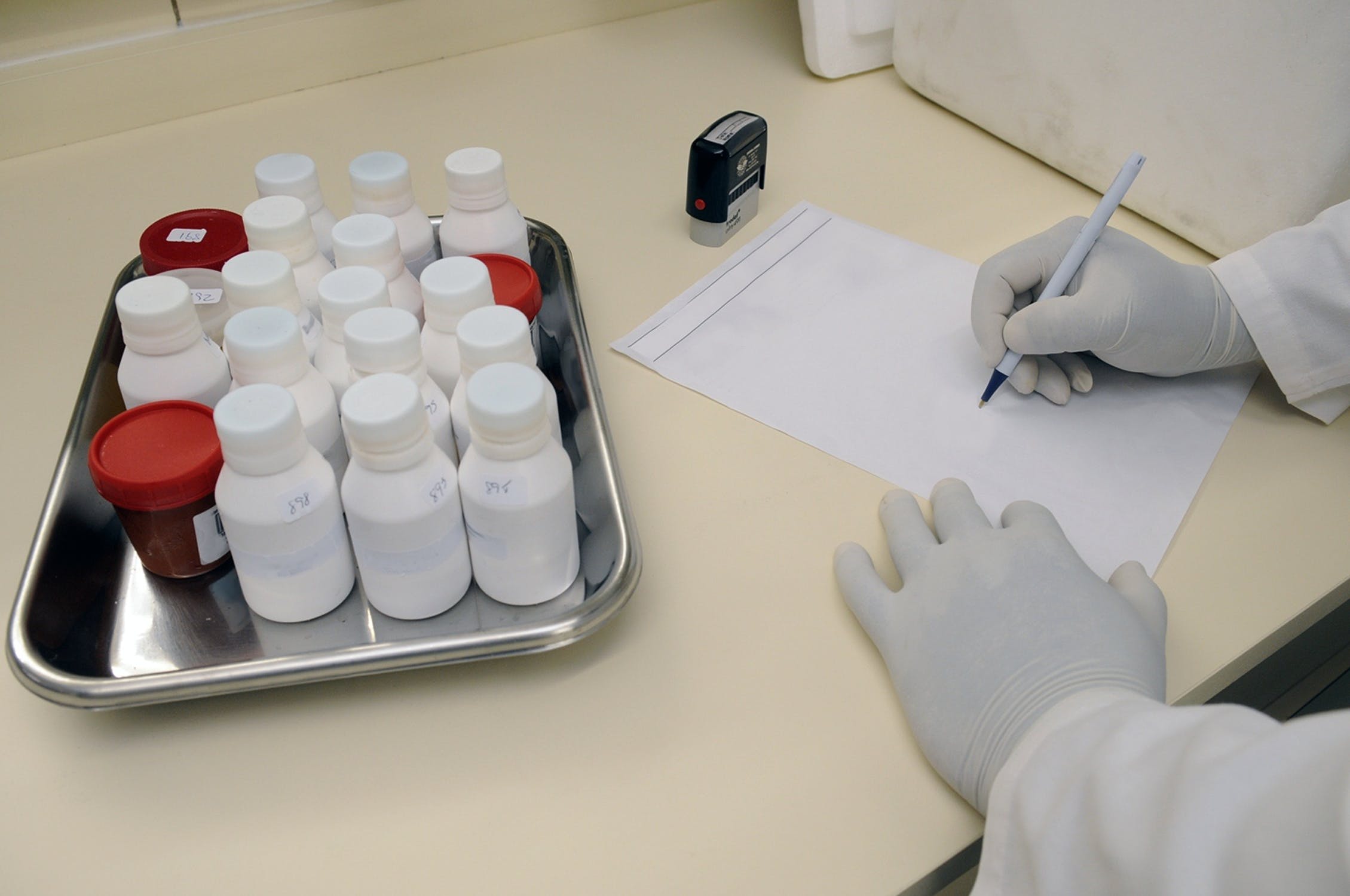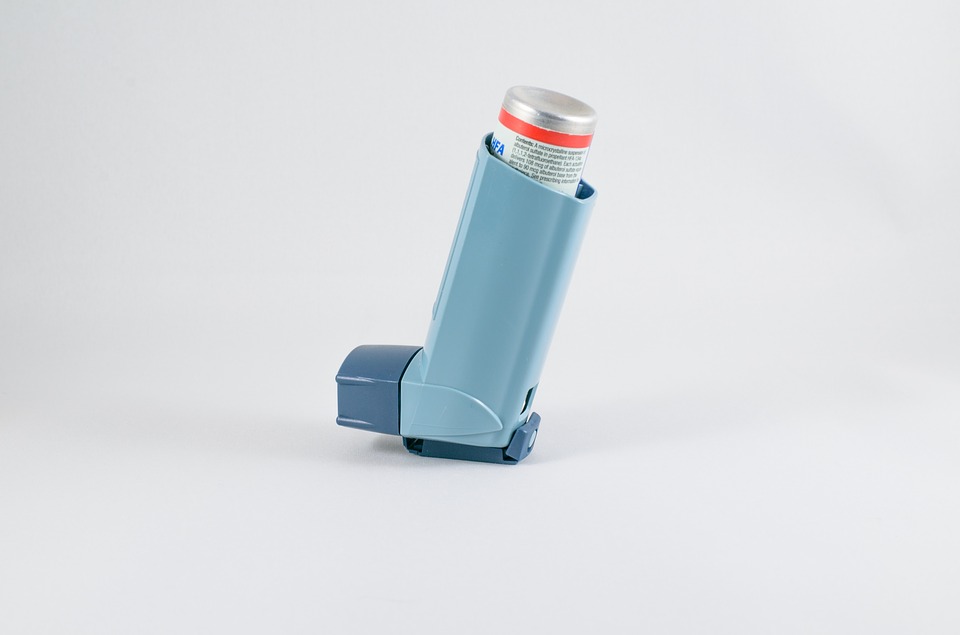Dulera is a prescription medicine that is used for the treatment of asthma. It is a combination product containing mometasone furoate, a corticosteroid, and formoterol, a long-acting beta2-adrenergic agonist (LABA).
According to the Federal Drug Administration, Dulera is only meant to be used to for asthma patients whose disease is not adequately controlled by a long-term asthma controlled medication, like an inhaled corticosteroid (ICS).[1]
Asthma
Asthma is a chronic respiratory condition that affects the airways of the lungs. It specifically causes the narrowing of bronchioles due to tightening of the muscles around them, accumulation of mucus, and/or the inflammation of their lining. Bronchioles are the smaller airways through which air moves in and out of the lungs during the respiration process.
As a result of the narrowing of the bronchioles, the affected person experiences difficulty in breathing, shortness of breath, severe cough, congestion, and wheezing.
Asthma treatment generally includes using one or a combination of medications that help to reduce inflammation and dilate the airways.
Dulera Mechanism of Action
Mometasone furoate is a synthetic corticosteroid that is similar to cortisol – a natural hormone produced by the adrenal glands. It belongs to the category of anti-inflammatory corticosteroids, which means it helps to reduce swelling of the airways.
Formoterol, on the other hand, is a long-term bronchodilator that helps to relax the muscles around the airways. As a result, the airways are dilated and the patient gets relief from the symptoms of asthma, like cough, wheezing, shortness of breath, and chest tightness.

Limitations
Dulera is not meant to be used as a rescue inhaler to get relief from an asthma exacerbation and/or acute bronchospasm.
Also, the medicine should not be used for children under 12 years of age.
Dosage of Dulera
The dosage of Dulera varies across patients. A patient’s history of asthma treatment and the severity of the disease are the two major factors that need to be considered to determine the right dose of Dulera.
Typically, doctors start with one inhalation of 200mcg/10mcg, twice a day at 12 hour distance and then may increase to two inhalations twice a day, if needed.
Maximum Dosage
The maximum dosage of Dulera is 800mcg/20mcg in a day – do not exceed this amount unless prescribed by your doctor.
Important: Dulera should strictly be administered when and as prescribed by the doctor. Do not change the dosage or discontinue the medicine on your own as it can cause negative effects.
What Should You Do In Case Of a Missed Dosage?
In case, you forget to take Dulera, skip the missed dosage and take the next regular dosage on its time. Never take a double dose to make up for the missed one.
What Should You Do In Case of Overdose?
An overdose of Dulera may cause irregular heartbeat, tremors, chest pain, and severe trouble in breathing. It may also cause you to faint. To avoid the serious effects, immediately get medical help if you have mistakenly overdosed.
If there isn’t any other option available, call the poison control center at 1-800-222-1222 (for the US residents only).
How to Use Dulera
Use Dulera the same way you use your regular asthma inhaler. Make sure to shake the inhaler well before use. Also, if you are to take to inhalations or if you are using another inhaler at the same time, take at least a minute’s gap after one inhalation and then take the other.
Always gargle and/or rinse your mouth with water after using Dulera to prevent oral thrush, and irritation and dryness in mouth and throat. Make sure to not swallow the water and spit out all of it.

How Long Does Dulera Take to Provide Relief?
Dulera inhaler may take about a week before a patient experiences the full benefits of the medicine. However, it may take a little longer in some cases.
- Possible Side Effects of Dulera
- The most common side effects of Dulera include:
- Nasopharyngitis i.e. the swelling of the back of the throat and nasal passage, also called upper respiratory infection
- Stuffy nose
- Throat irritation, dry mouth, or hoarseness
- Headache
- Sinusitis
- Tell your doctor if these conditions do not go away in a week or worsen with time.
Serious Side Effects of Dulera
While the serious side effects of Dulera are rare, it is better to be cautious and immediately report to the doctor if you experience any of them. Some possible serious negative effects that a patient using Dulera may experience include:
- Serious allergic reactions, like swelling of the mouth, tongue, and face, hives, or rash.
- Oral thrush i.e. yeast infection in mouth and throat.
- Increased susceptibility to infections and the worsening of existing infections, ocular herpes, and tuberculosis. Some common signs of infection include fever, chills, nausea, vomiting, body aches, and fatigue.
- Worsening of breathing problems, such as increased wheezing right after inhalation. It is recommended to always have a rescue inhaler at hand so you can treat sudden aggravation of breathing issues.
- Eye issues, like blurred vision, glaucoma, and cataracts.
- Increase in the blood sugar level.
- Decrease in the level of potassium in the blood.
- The medication may also lead to lower bone mineral density in people who are already at a higher risk of it, for example, people who are at the risk of osteoporosis.
- Patients shifting from oral corticosteroid medicines to the inhaled corticosteroids, may experience reduced adrenal function with Dulera usage.
Tell your doctor as soon as possible if you experience any of the following:
- Worsening of breathing issues
- No improvement in asthma symptoms after regularly using Dulera for two weeks
- An increased need for using your rescue inhaler
- Need to use four or more inhalations of your regular rescue inhaler for at least two consecutive days
- Decreased effectiveness of your regular rescue inhaler in relieving asthma symptoms
Who Should Not Use Dulera?
Do not use Dulera if:
Your disease is well controlled with other asthma medications
You are allergic to any of its ingredients – do check the list of ingredients before you start using the medicine
Dulera should also be avoided if you suffer from certain diseases or health conditions or develop any of them while you are on Dulera treatment. Make sure to tell your doctor is you have or develop:
- Hypertension
- Heart problems
- Diabetes
- Seizures
- Hyperthyroidism or hypothyroidism
- Osteoporosis
- Liver problems
- Eye issues, like changes in vision, cataracts, glaucoma, or increased pressure in the eye
- Aneurysm i.e. swelling of an artery
- A weak immune system or any disease that affects the immune system
- Tumor of the adrenal gland
- If you are suffering from or have a history of infections, like herpes and tuberculosis
- If you are using any prescription and/or non-prescription medicines and herbal products
In addition to these, make sure to tell your doctor if you are:
- Allergic to any medications
- Scheduled to have a surgery
- Pregnant or planning to become pregnant
- A nursing mother
Contraindications
Dulera can cause hypersensitivity if used with the primary treatment medications for status asthmatics, acute bronchospasm, and/or exercise induced bronchospasm.
Dulera usage should also be avoided with any medication that contains LABA due to the risk of overdose. When overdosed, LABA may cause a sudden decrease or increase in blood pressure, irregular or fast heartbeat, weakness, dizziness, nervousness, headache, tremor, seizure, and/or chest pain.
The following medications may increase the effects of formoterol (one of the active ingredients in Dulera) on blood pressure and heart and hence, should be avoided to be used with or within 14 days of their discontinuation:
- Tricyclic antidepressants, such as amitriptyline
- Monoamine Oxidase Inhibitors (MAOIs), for example tranylcypromine
Certain drugs can reduce the breakdown of mometasone furoate by the liver enzymes. As a result, the level of the drug increases in the body, which then will increase or worsen the negative effects of Dulera. Some of the drugs that can have this effect are:
- Clarithromycin (Biaxin)
- Atazanavir (Reyataz)
- Itraconazole (Sporanox)
- Indinavir (Crixivan)
- Telithromycin (Ketek)
- Nelfinavir (Viracept)
- Ketoconazole
Dulera can also cause negative effects if used with:
- Medications that have an immunosuppressant effect
- Anti-fungal medicines, like ketoconazole
- Anti-HIV medication, especially the ones that contain cobicistat and ritonavir. Some of the medicines that contain ritonavir are NORVIR (both oral solution and soft gelatin capsules) and KALETRA.
Precautions
As mentioned above, Dulera can increase a patient’s susceptibility to infections as well as can worsen the existing ones. Therefore, it is recommended for patients taking Dulera to avoid contact with people who are suffering from infections that can spread to others, like flu, measles, and chickenpox.
Dulera is not generally meant to be used for very long periods of time because it can affect the body’s ability to respond to physical stress. This is why doctors only prescribe it when other asthma medications do not work. Even when prescribed, Dulera is usually administered only for a limited period of time to control the symptoms of asthma. Once the disease is under control, doctors gradually move the patients to alternative medications, in most cases.
Storage[2]
Dulera should be stored at room temperature between 68 to 77 degrees Fahrenheit (20 to 25 degrees centigrade). Since the canister of the medicine contains drugs under pressure, it should not be stored at a high temperature or near heat and open flame. Storing Dulera above 120 degrees Fahrenheit may cause the canister to burst.
After priming, the 60 actuation inhaler should be stored with the mouthpiece sideways or down.
Where to Buy Dulera From
In view of the possibility that some uncertified sellers may be selling fake medicines, always buy all your medications from a certified pharmacy; whether retail or online.
Do not be tempted to buy from pharmacies that are selling medicines at significantly lower rates – there is a high likelihood that they are not original.
If you cannot afford to buy Dulera, or any other medicine, and do not even have the insurance, look for a prescription assistance program and apply for it to get all your prescribed medicines at low-costs or for free.
What is a Prescription Assistance?
For those who do not know, prescription assistance programs are sponsored programs that have been designed to ensure the availability of prescription medicines to people who are uninsured, underinsured, not eligible for the medical aid programs run by the government, and cannot afford to buy them on their own.
- Many prescription drugs manufacturers offer such programs, so you are sure to find one that offers the medicines that you need.
- Applications for prescription assistance programs are free. The only requirements to qualify for them are:
- You have to be a US permanent resident or citizen
- You should be able to demonstrate financial needs due to limited earnings
- Prove that you have limited or no prescription drug coverage from a private source or government
Prescription Assistance for Dulera
Merck Patient Assistance Program provides prescription assistance for Dulera. It is a private program that provides free of cost medicines to the eligible individuals. If you are not already registered with a prescription assistance program, visit www.merckhelps.com/DULERA to determine your eligibility for the Merck’s program.
[1] https://www.accessdata.fda.gov/drugsatfda_docs/label/2010/022518s000lbl.pdf
[2] https://www.merck.com/product/usa/pi_circulars/d/dulera/dulera_ppi.pdf

